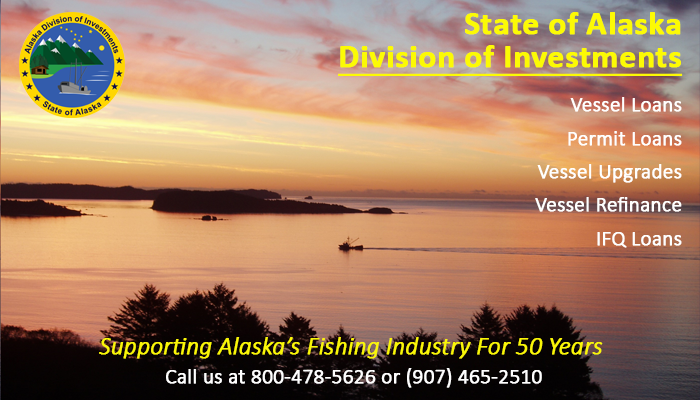The Fish Ticket
July 15, 2024
Permits & State Fisheries
We're still getting quite a bit of interest in permits, despite the season being well underway - check 'em out below!
Harvests in Bristol Bay are strong, and the University of Washington has revised their preseason run estimate by 17% to over 53 million fish and their harvest estimate by 13% to 35 million. According to IntraFish, that's all well and good, but the fish appear to be following the same statewide trend we've seen in recent years - they're small. Like, really small. For the first time in decades, the average size dropped below 5 pounds. This means that not only will the same number of fish net a lesser gross weight for the fleet, but it also makes existing gear less effective, as the mesh size is just slightly too big for the smaller fish. In Prince William Sound, sockeye harvests have far surpassed recent years, but chum numbers are notably lower and the pinks haven't really shown up yet. In Cook Inlet, sockeye is tracking behind last year and the 5-year average and there are no pinks to speak of yet.
In Chignik, fishing has been open for roughly a week, although harvests so far appear low. In Kodiak, chums showed up earlier and stronger than in previous years, sockeye harvests to date are substantially lower than last year, the year before, and the 5-year average, and the pinks harvest is at about half of 2022 YTD levels. Not great.
Chums have also shown up strong in Southeast, where harvests are roughly on par with last year and far surpassing the 5-year average. Sockeye harvest is behind last year, but on par with the 5-year average, and pinks are slowing starting to show up.
This information comes from ADFG's weekly tracker, which is pretty fun to play around with. For a simpler snapshot, here's ASMI's weekly harvest update #3, which shows harvests through July 6.
IFQs & Federal Fisheries
I don't want to get anybody's hopes up, but the quota market has a pulse! A weak one, but a pulse nonetheless. Unblocked B class 3B halibut quota sold at $24.00 this week, and blocked 3A C class sold at $24.00 again, on par with last week's sale. There's some interest in sablefish quota as well. (Don't say it out loud though, let's not jinx anything, okay?!)
Speaking of sablefish, a new study confirmed that black cod are open-minded party animals. Unlike other species like salmon, which are bigoted little buggers that return home to spawn with their own, black cod are more nomadic and will spawn just about wherever, with whomever; they don't discriminate based on birthplace nor do they head "home" to spawn. This is both an important confirmation for the management of sablefish and a fun fact that sablefish should really consider adding to their Tinder profiles.
What Else?
Mark your calendars! the Pacific Marine Expo returns November 20-22.
Minerva Pérez Castro, president of Mexico’s National Chamber of Fisheries and Aquaculture Industries, was shot dead on Monday, just hours after calling for commitment to sustainability and condemning the rampant illegal fishing practices hindering the country's legitimate industry. Although the presence of Mexican cartels in the industry is well documented, the shooter is yet unknown.
Circle Seafoods announced it'll be delaying the launch of its salmon freezer barge until next season, while continuing to operate their Southeast Alaska shoreside processor this year.
US snow crab imports have sky rocketed this year, primarily from Eastern Canada, with total imports up 36% year over year. The lack of Russian crab on the market has led to price increases of up to 60%, but demand remains strong.
In the pollock world, executives are also starting to see the effects of the Russia ban and are feeling more optimistic.
For the second year running, Governor Dunleavy vetoed the $10 million in funding for ASMI that had garnered bipartisan support in the state legislature. The veto comes as a bit of a slap in the face as the industry battles these unprecedented challenges, some of which surely could have benefitted from bolstered marketing of Alaska seafood both domestically and abroad. Lessening the blow a bit, ASMI announced this week that they received another $4 million from the feds (in addition to the two $500,000 SK grants they were awarded in May). This time, the funds come from a new Regional Agricultural Promotion Program at the Department of Agriculture.
The Governor also vetoed funding for Kodiak's St. Herman Harbor replacement project.
In other Kodiak news, the city council unanimously voted to cut a break to commercial fishermen, reducing harbor fees for slipholders by 25% for six months. It couldn't come at a better time. The city is also making progress ridding itself of derelict vessels. This time, three fiberglass boats are up for disposal, as well has a 78' steel longliner.
On the other side of the spectrum, Cordova has just finished rebuilding their harbor, "which is now one of Alaska’s largest single-basin harbors." The price tag? About $40 million.
The 52' seiner F/V Jaci Grace sank just south of Metlakatla on June 30. Quick action and Good Samaritans led to a best-case-scenario ending and no injuries were reported.
One of the three crabbers accused of taking crab harvested in Alaska to Washington without first landing them in Alaska, has pled guilty to violations of the federal Lacey Act.
As we know, the deadline to comment on the proposal to list Chinook salmon as threatened or endangered under the Endangered Species Act was extended to September 6. If you've lost track of how we got to this point, who's on what side, and why ADFG is upset about it, here's a pretty concise rundown.
US Senators and members of the fishing industry are [still] calling on the MSC to rescind its certification of Russian pollock.
A US Appellate Court heard arguments this week on another fisheries-related case, which has the potential to upend the way federal fisheries are currently managed (by regional management councils). The case centers around whether the makeup of the councils is constitutional, with the plaintiffs arguing that it's not, and the regulations enacted by them are therefore unconstitutional as well. As of now, there's no telling which way the court will go, but if they side with the government, an appeal to the Supreme Court is likely. Between SCOTUS overturning Chevron and this case, fisheries management might look quite a bit different in the coming years.
The US Government Accountability Office issued a report this week telling regulators to up their fisheries monitoring and bycatch reduction game. Yeah, that's fair.
The US Coast Guard reported spotting four Chinese military ships near the Aleutian Islands. The ships were in international waters within the US EEZ. Their presence did not break any international laws or norms, but was still alarming for locals and the fishing fleet.
On this week's Alaska Fisheries Report: Alaska Seafood Marketing Association (ASMI) funding, sablefish genetics, and fishing citations in Bristol Bay.
On last week's Bering Sea Barometer: Pete Neaton offers updates on statewide harvests. The pinks haven't showed up in PWS yet, where they're typically expected around the 4th of July.






